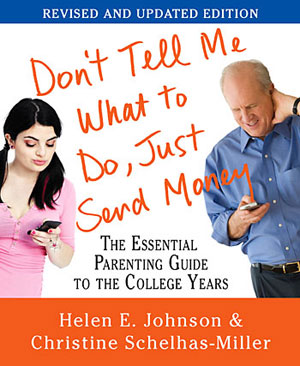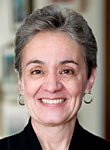By Ted Boscia
Reprinted from Cornell Chronicle, June 27, 2011
Thanks to the long reach of texting, Skype, Facebook and other social media, college students have never been more connected to their parents -- trading messages and speaking an average of 13 times per week according to one study.
But such frequent contact raises the temptation for parents to run their children's lives, sometimes going as far as selecting their courses, editing assignments and intervening in disciplinary and academic matters.
 In her newly updated book, "Don't Tell Me What to Do, Just Send Money: The Essential Parenting Guide to the College Years" (St. Martin's Griffin), Christine Schelhas-Miller, senior lecturer in the College of Human Ecology, gives parents practical advice on loosening the so-called electronic umbilical cord, along with tips for such common challenges as the freshman 15, internships, roommate problems, financial pressures and time management.
In her newly updated book, "Don't Tell Me What to Do, Just Send Money: The Essential Parenting Guide to the College Years" (St. Martin's Griffin), Christine Schelhas-Miller, senior lecturer in the College of Human Ecology, gives parents practical advice on loosening the so-called electronic umbilical cord, along with tips for such common challenges as the freshman 15, internships, roommate problems, financial pressures and time management.
For the guide, co-authored with Helen Johnson, an educational consultant and former director of Cornell's Parents' Program, Schelhas-Miller shares her wisdom gained in 30 years as an educator, adviser and residence hall director -- as well as the mother of two college-age daughters. Her key advice: Parents need to relinquish control over their children's lives and "change their roles from supervisors to consultants."
"As a faculty member, parents call me when their children are dissatisfied with grades, and it's become all too common to find parents editing students' papers," said Schelhas-Miller. "The risk is having children who graduate without the skills to make decisions, solve problems and take responsibility for their own lives."
Schelhas-Miller teaches several courses in the Department of Human Development, including the popular Adolescence and Emerging Adulthood, where she discovered that many Cornell students are no different than their peers when it comes to continuous contact with their parents.
The first edition of the book published in 2000.
Ted Boscia is assistant director of communications for the College of Human Ecology.


